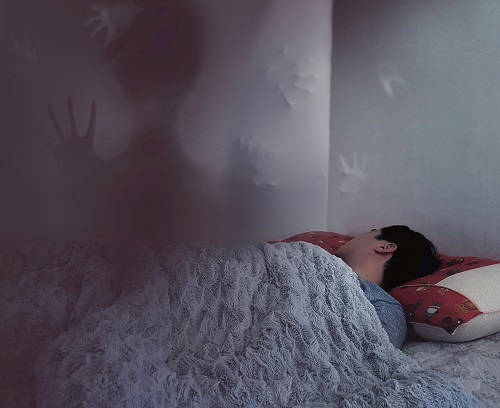Koreans have long been aware of the phenomenon of “gawinulim,” which roughly translates into “being pressed down by something scary in a dream.” Many have thought it caused by a ghost or spirit lying on top of or pressing down on the sleeping body.

A study published Thursday by Korea University Anam Hospital dispelled this notion, saying that the cause of the phenomenon, formally known as sleep paralysis, is due to irregular sleeping habits, sleep deficiency, and stress.
Sleep paralysis is a feeling of being conscious but being unable to move. It occurs while falling asleep or when waking up. It causes the sufferer to lose all strength and experience hallucinations that involve hearing voices, seeing strange or horrifying figures and remembering painful or traumatic past events.
Some report seeing or hearing the presence of a ghost or a monster or feeling a sense of physical pressure or choking. The sleeper may try to move the body out of fear and scream for help but find they are unable to do so. It lasts from a few seconds to a few minutes, the study said.
Although the phenomenon has been commonly attributed to haunting or terrifying spirits, the study said gawinulim is only a type of sleeping problem that shows the body is not moving clearly through two stages of sleep.
According to the study, the hallucinations and sense of anxiety that arise from these paranormal experiences are due to being caught in between two sleep cycles: rapid-eye-movement (REM) and non-rapid eye movement (NREM). The NREM state comes first and takes around 75 percent of the overall sleeping time, followed by REM before waking.
In REM sleep, most muscles in the body hold no tension and enter a state of paralysis. The only exceptions are the muscles required to breathe and move the eyes. Typically, the person’s muscles swing between a tense and relaxed state as they cycle through NREM and REM sleep, the study said.
The problem arises when people wake up in a REM state, causing a situation where the mind gains consciousness, but the muscles remain paralyzed. The feeling of paralysis jumpstarts the fear instinct and causes the sleeper to see figures or voices that are not real, the study said.
The condition, the hospital said, affects around 40 to 50 percent of the total population and should not be a matter of great concern. It usually does not require treatment unless other factors such as genetic sleeping disorders or narcolepsy interfere with daily life get involved. Examination and treatment for other factors these conditions may then be necessary, the hospital said.
“Sleep paralysis is caused by irregular sleep habits, lack of sleep, stress and a strong visual stimulus,” said Professor Cho Chul-hyun from Korea University Hospital’s Department of Psychiatry. “Maintaining proper sleeping habits, adequate amounts of sleep, stress levels, and a peaceful mind usually take care of it.”

